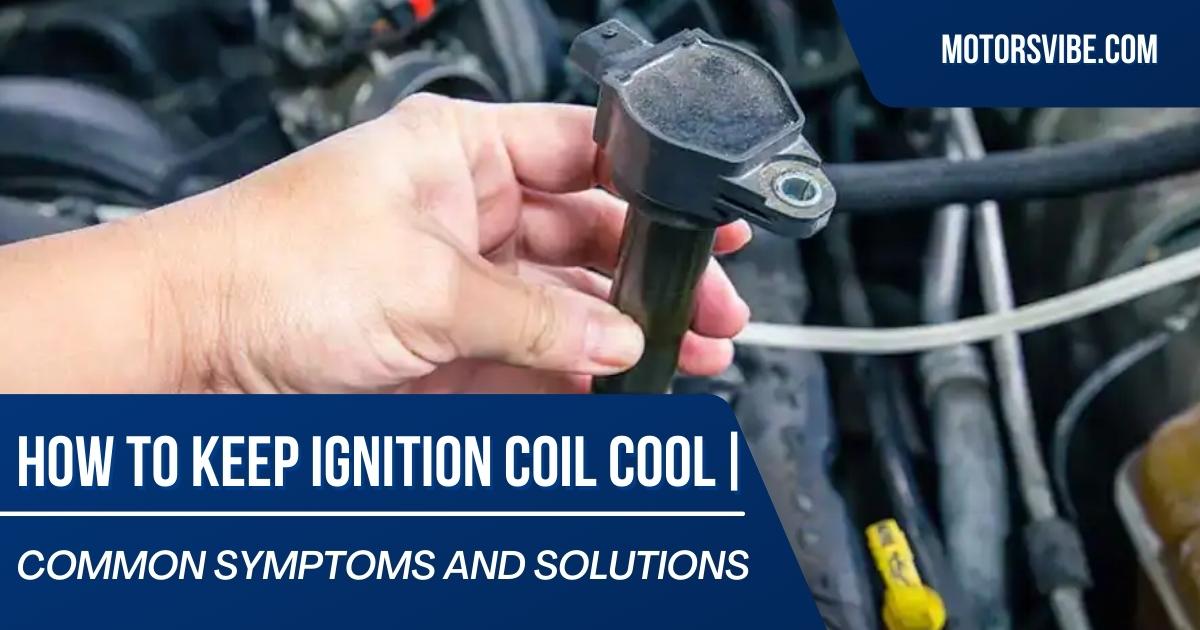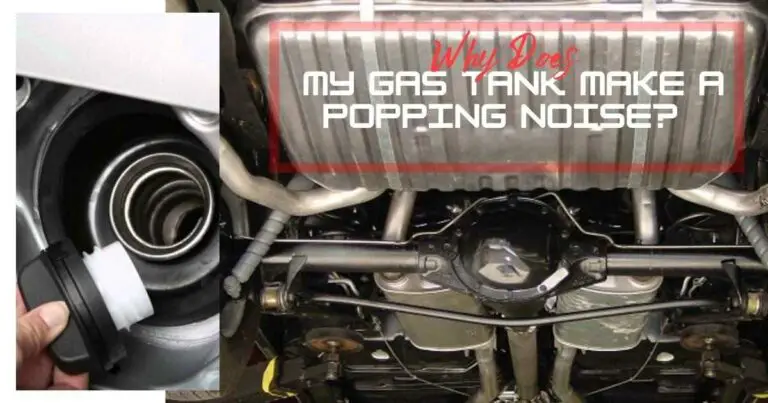How to Keep Ignition Coil Cool | Common Symptoms and Solutions
The ignition coil is the unsung hero behind the generation of high-voltage spark necessary for igniting the fuel-air mixture. Without a properly functioning ignition coil, the engine wouldn’t start, meaning the vehicle would not be able to run.
As such, an efficient ignition coil performance is essential for optimal engine operation and overall vehicle performance. One factor that can significantly impact the ignition coil‘s effectiveness is its operating temperature.
As the engine runs, the ignition coil isn’t immune to the challenges it faces, and heat becomes a thorn in the fresh of the ignition process. Therefore, understanding how to keep the ignition coil cool is essential for maintaining a reliable and responsive ignition.
Bad Ignition Coil Symptoms
If your car has been struggling to start or the engine shaking has become a noticeable issue during your rides, it could be a sign of a bad ignition coil. A faulty ignition coil poses several risks to your vehicle’s performance and can lead to more severe issues if not addressed promptly. Some of the common symptoms of a bad ignition coil include;
Misfires
One of the most noticeable signs of a bad ignition coil is engine misfires. The misfires can manifest as a rough or uneven idle, which makes the vehicle shake or vibrate unexpectedly. Additionally, you can experience hesitation or jerking sensations during acceleration.
Difficulty Starting
Difficulty starting the engine is a common sign of a faulty ignition coil. If the ignition coil is compromised, it might struggle to generate the necessary spark to ignite the fuel-air mixture. This can result in prolonged cranking, where the engine takes longer to start or fail to start altogether.
Poor Fuel Economy
Poor fuel economy can also be a consequence of a malfunctioning ignition coil. When the ignition coil is not operating correctly, it disrupts the combustion process, leading to incomplete burning of fuel. This can impact overall engine performance and make the vehicle consume more fuel than necessary.
Stalling
Stalling is a common problem associated with a failing ignition coil. Generally, a faulty ignition coil can lead to intermittent stalling or, in more severe cases, a complete shutdown of the engine while driving.
Engine Backfires
A faulty ignition coil is also a leading cause of engine backfires. The backfires are characterized by a distinctive popping sound from the exhaust or intake system. This occurs when the ignition coil fails to deliver a timely and controlled spark, leading to unburned fuel igniting in the exhaust or intake system.
Check Engine Light
The check engine light can illuminate for various reasons, including issues related to the ignition coil. This warning serves as an indicator that there may be underlying problems with the ignition coil.
Reduced Power and Acceleration
A compromised ignition coil is bound to diminish the power output and lead to sluggish acceleration. This can be particularly noticeable during uphill climbs or when accelerating rapidly.

What Causes Ignition Coil to Get Hot?
Overloading
The primary reason behind ignition coil overheating is overloading. If you subject the coil to continuous and excessive demand, it experiences an increased workload. As the demand rises, the coil is forced to work harder and for longer durations, leading to an increase in heat production. If sustained, the excess heat can contribute to the deterioration of the insulation materials within the ignition coil, leading to internal failures or electrical breakdowns.
Battery Issues
The ignition coil relies on a consistent and stable power source to function effectively. If the battery power supply is unstable, it poses a risk of ignition coil burnout. Fluctuations or inconsistencies in battery power can also lead to increased stress on the ignition coil, which might result in burnout.
Faulty Spark Plugs
Faulty spark plugs can significantly impact the performance of the ignition coil and, consequently, the overall efficiency of the combustion process. If the spark plugs are worn or improperly gapped, they will struggle to generate a strong and consistent spark for igniting the fuel-air mixture in the engine.
The ignition coil responds to the shortcomings of faulty spark plugs by working harder to compensate for the reduced effectiveness. The increased workload, in turn, results in the generation of more heat or short circuits during the ignition process.
Voltage Overload
A voltage overload poses a significant risk to the proper functioning of the ignition coil. When the electrical system experiences a surge in voltage, the ignition coil may be subjected to excessive electrical stress. This, in turn, prompts the ignition coil to work harder and generates more heat than it is designed to handle.
As the ignition coil is sensitive to changes in electrical input, prolonged exposure to high voltage levels can result in overheating. This not only compromises the coil’s efficiency but may also lead to permanent damage.
Poor Ventilation
If your ignition coil is poorly ventilated, it becomes more susceptible to overheating. The lack of airflow impedes the natural cooling process, making the heat generated during operation accumulate. The excess heat can, in turn, compromise the insulation materials, leading to diminished efficiency and, in extreme cases, component failure.
Aging or Damaged Coil
As ignition coils undergo wear and tear, the insulation materials and internal components may deteriorate, compromising their ability to effectively transform low-voltage electrical energy into the high-voltage sparks needed for combustion. This can result in increased electrical resistance within the coil, leading to more heat production during operation.
Computer Issues
The ignition module plays a crucial role in managing the ignition coil’s firing sequence. If the module transmits faulty ignition signals, they can generate irregular sparks, thereby placing additional stress on the ignition coil. As a result, the coil is forced to work harder, making it generate more heat than it can dissipate.
Poor Ground Connection
A proper ground connection is also crucial for the efficient functioning of the ignition coil. If the grounding is inadequate, it can lead to increased electrical resistance in the coil’s circuit. This might create a situation where the coil is forced to work harder to generate the necessary spark for combustion.
The additional workload results in the production of more heat than the coil is designed to handle under normal operating conditions. Also, if the ignition coil lacks a solid ground connection, it may experience voltage fluctuations and inconsistencies. This can lead to erratic sparks, which might put undue stress on the ignition coil.
How to Keep Ignition Coil Cool
If you notice symptoms of an overheating ignition coil, such as misfires or difficulty starting, it’s crucial to take precautions to avoid further damage. Ignoring these indicators may lead to more severe issues and damage to other engine components. That said, here are a few steps you can take to keep the ignition coil cool;
Proper Ventilation
Proper ventilation is crucial for maintaining the optimal operating temperature of the ignition coil. This involves ensuring that the engine compartment has adequate airflow to dissipate the heat generated during the ignition process. You may also want to avoid blocking air passages or enclosing the ignition coil tightly to prevent overheating.
Proper Placement
If possible, place the ignition coil in a location that allows for better heat dissipation. Avoid placing it near exhaust components or areas prone to excessive heat.
Heat Shield
Installing a heat shield plays a critical role in safeguarding the ignition coil from direct exposure to high temperatures. The shield acts as a protective barrier that helps to reflect and redirect heat away from the coil.
Quality Spark Plugs
Using high-quality spark plugs with accurate gap settings is crucial for optimizing the performance of the ignition coil. High-quality spark plugs contributes to efficient combustion, which helps prevent unnecessary workload on the ignition coil and minimizes heat generation.
Avoid Overloading
Be mindful of driving conditions, especially during high-speed driving or when carrying heavy loads. Ideally, prolonged stress on the engine can increase the demand on the ignition coil and contribute to heat buildup.
Cooling Systems
Installing cooling systems, such as fan-assisted heat sinks or additional cooling fans, can significantly enhance the dissipation of heat around the ignition coil. These add-ons work to regulate the temperature in the engine compartment, which helps prevent excessive heat buildup.
Insulation
Ensure that the ignition coil is insulated properly from other heat-producing components in the engine compartment. This will help prevent the transfer of heat from nearby sources within the engine compartment.
Choose the Right Ignition Coil
When replacing the ignition coil, consider high-performance or aftermarket options designed for better heat dissipation and durability. High-performance ignition coils often incorporate advanced materials that enhance their ability to dissipate heat effectively. They are also designed to handle the demands of the engine and maintain optimal performance even in challenging environments.
Frequently Asked Questions
How long do ignition coil lasts?
The lifespan of an ignition coil can vary depending on several factors, including driving conditions, maintenance practices, and the quality of the component. Generally, ignition coils are designed to be durable and can last anywhere from 80,000 to 100,000 miles or more. However, some may fail earlier, while others can exceed their mileage ranges.
Does cold weather affect ignition coils?
Like any other engine component, the ignition coil can be affected by cold weather in several ways. For instance, low temperatures can make engine oil more viscous, which might hinder the movement of the ignition coil. Additionally, the formation of condensation in the engine compartment can introduce moisture that may impact the ignition coil performance.
Parting Shot
An overheated ignition coil poses serious risks, including the potential for hazardous exhaust fumes and adverse effects on surrounding components. As such, safeguarding your ignition coil from overheating is key to sustaining optimal engine performance. Remember, catching overheating issues early enough can save you time, money, and headaches down the road.






